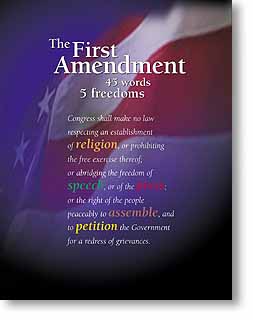
Time Magazine is coming out with a new poll this week that shows that President Bush’s approval ratings have slipped once again, to 35 percent, with only 33 percent saying they approve of the way he is handling the war in Iraq. This is a rather startling development, given the recent spate of essentially good new the administration has enjoyed: the death of al-Qaeda in Iraq leader Abu Mousab al-Zarqawi, Karl Rove’s non-indictment in the outing of a CIA agent, and a fairly robust economy even in the face of gasoline prices that hit $3.46 in Chicago over the weekend.
So it comes as no surprise that the President, his puppetmaster Dick Cheney, and their usual chorus of slavish dittoheads in Congress, FoxNews, the blogsophere and talk radio would attempt to change the terms of the debate by attacking the press, namely the New York Times. Their argument is that the Times is traitorous because it ran a story last week about how the government tracks financial data to sniff out terrorist plans and movements.
There’s a name of this type of argument: ad hominem, which means “go to the man.” In this case, rather than engaging the New York Times in a debate about the merits and dangers of this type of data mining, the administration and its surrogates have attacked the character of the men (and women) of the nation’s 2nd largest newspaper. This type of argument against the press is nothing new. Richard Nixon and his felonious vice-president Spiro Agnew have fulminated against the press in an effort to move the debate away from their own failed policies in Vietnam and criminal behavior. This new attack, however, reaches an uglier level, because treason is a crime punishable by death.
One line you hear from the usual suspects on TV, such as the national hypocrite and moralistic pontificator Bill Bennett, is that no one gave the press the right to decide what’s secret and what isn’t. That’s an amazing comment, particularly coming form Bennett, who was President Reagan’s Secretary of Education. Apparently though he is none to well educated himself, for if he had read his history he would not have needed telling by William Safire that the Founding Fathers explicitly wrote the First Amendment to the Constitution to protect the press’s roll of critiquing, criticizing, and balancing the government.
Looking at the argument more carefully, however, we can use British philosopher Stephen Toulmin’s method to break an argument into its component parts in order to see more clearly its strengths and weakness by looking at the “claims” and “warrants” of the argument. In order for the argument to hold up, Toulmin notes, the warrants must support the claim. The claim here is easy and in two parts: the New York Times published secrets in a time of war, and publishing secrets in a time of war is treasonous. The warrants here, however, are not quite as clear and need a little developing:
- the material the NYT published was secret until the NYT published it
- the NYT has no right to publish secrets
- it’s “Ok” that the material in question was deemed “secret” by the government
- the terrorists did not already know these secrets
- no one else has published these secrets
- the material in question should not be debated
- there’s nothing in the material in question that should alarm the American public
- we trust our government
- what our government does is always legal
- no one in government would use any of the data mining to harm innocent law-abiding citizens
- what our government does is always in our best interests
The list of warrants that emanate from this claim of course goes on and on, and you can see where I’m heading. Ponder this please as you enjoy the 4th of July holiday.




